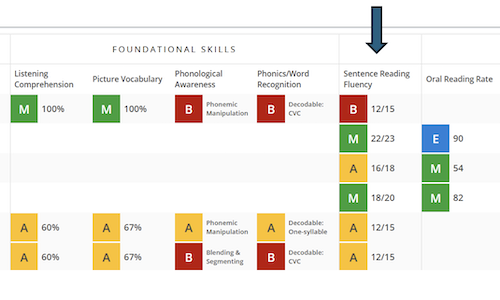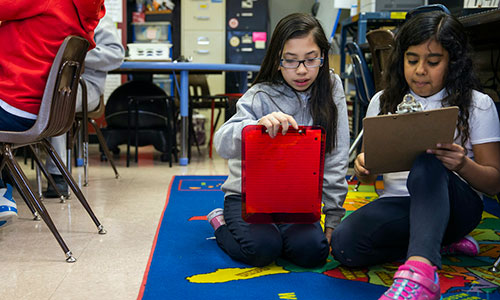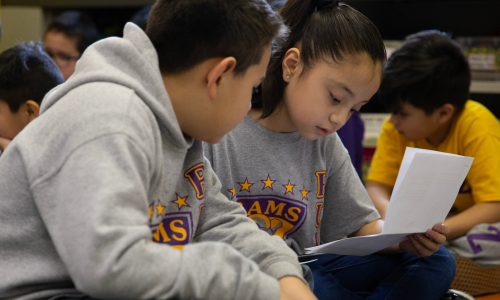
Understanding when and how to use data in education can be intimidating. I’m here to help.
In my post titled “K–12 data leadership: Be the change for your school community,” I listed seven steps that can help school leaders gain confidence and use data effectively. In my previous post, I explored the importance of two of them: rewriting your identity and self-reflection. Now I’d like to dig into the benefits of starting small and seeking professional learning.
One small step
Most of us are familiar with the famous words Neil Armstrong uttered as he hopped off the lunar module and became the first person to set foot on the moon: “One small step for man. One giant leap for mankind.” Since then, there have been many iterations, but the saying always manages to convey the same idea: small steps are mighty.
When making a change in a personal habit or routine, we are often told to start small and keep our goals manageable. Growth is not one of those home renovation shows where they completely gut and renovate an entire house in a 30-minute episode. In reality (not reality TV!) a project like that takes months. And going room by room, rather than tackling a whole house at once, gives people the opportunity to catch their breath and assess with intention. Similarly, approaching data in education in more efficient and productive ways takes time.
When I work with school leaders, I orient them to a MAP® Growth™ report that has become a personal favorite: the School Profile report. Imagine taking the roof off your school and being able to look down into the building. That’s exactly what this report provides. Starting with a bird’s eye view allows you to look at overall trends, successes, and areas of need. From there, you can drill down to look into specific grades and even classrooms, so you can get a better look at what’s contributing to—or limiting—growth and achievement. The Class Profile report will come in handy then. It’s a teacher-level report you can use to have empowering conversations with your teachers. There are additional reports you could look at, of course, but starting with just two or three and diving deep with them will provide the foundation you need for robust data conversations that don’t overwhelm.
Another benefit of starting small, besides the lighter lift, is the ability to pivot as needed. If I decide to make a change to the light fixtures I selected for the kitchen, for example, it is much easier if I’m tackling my home remodel one room at a time. Starting small when strengthening your relationship to data will enable you to make decisions in real time and keep you well within your bandwidth.
Invest in your future as a data leader
Let’s stick with the remodel theme. As good as I am at home projects, I keep a comfortable budget handy for those moments when the scope of a project goes beyond my expertise. Once terms like “wet saw” and “sheetrock” start to appear in my Google search, I know it’s time I call the pros. The same way I would reach out for assistance to make sure my home project gets done efficiently and with integrity, you, as a school leader, should consider professional learning to enhance your skills.
In my first post discussing the importance of data in education, I referred to the moment in the movie 28 Days when Sandra Bullock is forced to wear a sign around her neck that says, “Confront me if I don’t ask for help.” School leaders often feel as though they need to either have all the answers or appear to have them. It is a burden placed on leadership that can feel more like a heavy mantle than a badge of honor.
I’m here to tell you that the leader who acknowledges an obstacle, blind spot, or general hang up and seeks out opportunities to learn and develop those skills is a true, reflective leader. In fact, thanks to my role as a trusted professional learning consultant at NWEA, I’ve had many conversations with school and district leaders that have led to a request for professional learning support. We offer a variety of professional learning experiences to help get you on your way—and keep you on the path—of data leadership. Visit our website and reach out to your NWEA contact to learn more.
Seeking professional learning can help you gain the confidence and know-how you need to use data in education confidently and efficiently. It also comes with some pretty fantastic unintended side effects. For starters, the people we meet in professional learning sessions are often there for similar reasons and often share a similar background, so there’s an opportunity to learn from new friends in a new environment. Additionally, professional learning can create the conditions for partnership and deeper exploration with the consultant leading your session. My relationships with school leadership have been the foundation for many fruitful conversations, including what comes next in a professional learning journey.
The only way out is through
Whether data feels as complicated as a full home renovation or a simple decor upgrade to you, it is important to start small and find help. Keep the scope of your learning and the growth journey you are on reasonable and in clear view. Adjust to fit your bandwidth, and make small adjustments as needed so you don’t get overwhelmed and give up.
Not if, but when you come to an obstacle that feels especially prohibitive, don’t turn back. Reach out to the professionals—as often as needed—who can walk with you along your path and keep you on track. More often, you’ll develop a working relationship, where your professional growth becomes their professional priority and pleasure. Even Dante needed Virgil.






